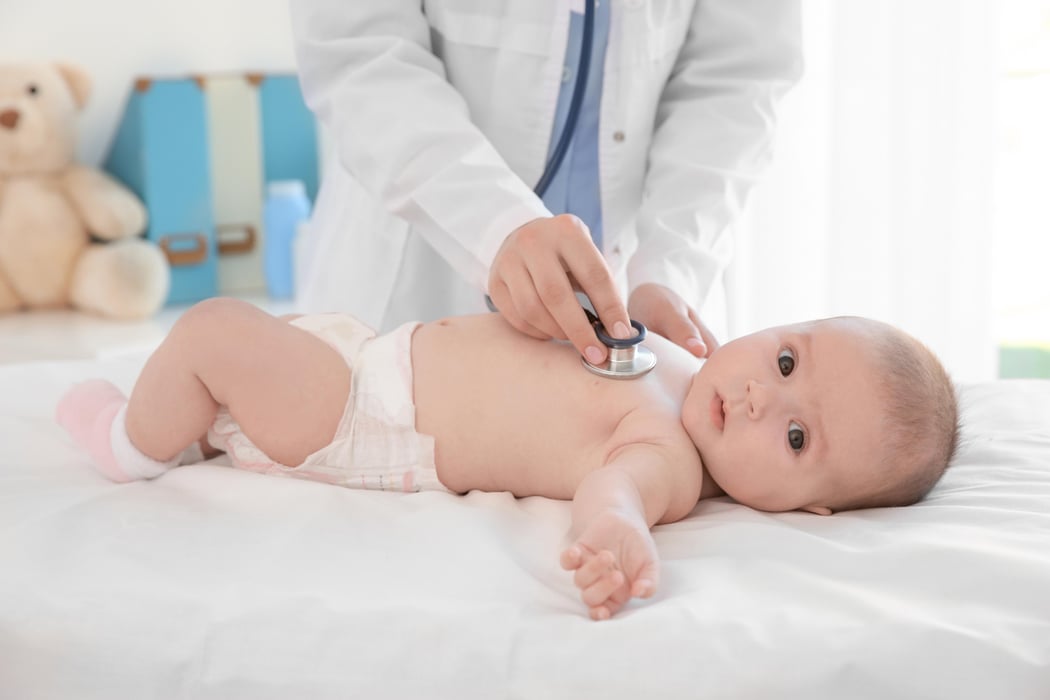Neurodevelopmental Issues Double in Babies Exposed to COVID in Womb: Study

FRIDAY, June 10, 2022 (HealthDay News) -- The babies of women infected with COVID-19 during pregnancy may have developmental difficulties during their first year, a new study suggests.
Researchers found that pregnant women with COVID-19 were more likely to have preterm births and infants with developmental problems. The greatest risk was in the third trimester, the study found.
"The kinds of diagnoses we see are delays in motor and speech milestones, but it's important to recognize that these are very nonspecific and may well resolve over time," said lead researcher Dr. Roy Perlis, director of the Center for Quantitative Health at Massachusetts General Hospital in Boston.
Perlis stressed that the abnormalities were rare and most infants were developmentally normal.
"The vast majority of offspring of mothers infected with COVID-19, even if they were delivered preterm, did not have these neurodevelopmental diagnoses. They also did not have any other abnormalities," Perlis said. "It is entirely possible that these differences between exposed and unexposed children will become smaller over time, as the developing brain is incredibly resilient."
Perlis said it will be important to follow the children with developmental difficulties, because other differences may emerge as they get older.
Although it's unclear how COVID-19 might cause these developmental problems, other studies have suggested that anything that causes inflammation during pregnancy can be tied to changes in brain development. "But we do not know the precise mechanism, if any," Perlis said.
And, he added, as variants of SARS-CoV-2 appear, they may affect babies in different ways.
"Our study focused on pregnancies that occurred earlier in the pandemic, so we do not know if there might be strain-specific effects, but we will certainly look at this in future studies," Perlis noted.
These potential dangers are another good reason for pregnant women and those who plan to get pregnant to get the COVID-19 vaccine.
"There are so many good reasons to be vaccinated, regardless of pregnancy status," he said. "Our study doesn't speak to vaccination effects, but if it encourages more women to seek vaccination, that would be a great outcome."
For the study, Perlis and his team collected data on nearly 7,800 births at six Massachusetts hospitals between March and September of 2020. In all, 222 of the mothers had tested positive for COVID-19.
Among those women, 14% had a preterm delivery, compared with about 9% of the women who weren't infected.
And, the investigators found, 6% of children born to infected moms had a developmental problem during their first year of life, compared with 3% of those whose moms weren't infected. The most common problems involved motor function, and speech and language difficulties.
Dr. Marc Siegel, a clinical professor of medicine at NYU Langone Medical Center in New York City, said that the study showed that even if a fetus doesn't get COVID from the mother, inflammation from the disease may cause problems after delivery.
"This is of concern and requires further study, and also emphasizes that getting the vaccine during pregnancy is not only safe but also decreases your risk of having problems with the baby from COVID itself," Siegel said.
He added that the effects of virus strains like Omicron remain unclear. In addition, it is not known if breakthrough infections after vaccination might result in similar developmental problems.
"We also don't know, and this is the most important thing, if neurodevelopmental delays or other neurological issues correlated with the severity of illness," he said.
Importantly, Siegel said, vaccination decreases disease severity.
"My suspicion is that the vaccine decreases your risk of the kind of COVID case that would impact your fetus," Siegel said. "So, even if this is just preliminary data, it's a further reason to get the vaccine during pregnancy."
The findings were published online June 9 in JAMA Network Open.
An accompanying commentary pointed out that as a look-back study, the research shows links between a mother's COVID status and a child's development, but doesn't prove cause and effect.
"Prospective studies to validate these findings, tease out some of the nuance, and identify those at highest risk will help health care practitioners appropriately dedicate resources as we follow the life course of this generation of children born during the COVID-19 pandemic," Dr. Torri Metz concluded. She's a doctor in the division of maternal-fetal medicine at University of Utah Health in Salt Lake City.
More information
The U.S. Centers for Disease Control and Prevention has more about COVID-19 and pregnancy.
SOURCES: Roy Perlis, MD, director, Center for Quantitative Health and department of psychiatry, Massachusetts General Hospital, Boston; Marc Siegel, MD, clinical professor, medicine, NYU Langone Medical Center, New York City; JAMA Network Open, June 9, 2022, online
Related Posts
Racial Disparities Seen Among Hospitalized Patients With Decompensated Cirrhosis
WEDNESDAY, July 26, 2023 (HealthDay News) -- Among individuals hospitalized with...
<40 Percent of Children With Firearm Injury Receive Mental Health Care
TUESDAY, June 6, 2023 (HealthDay News) -- Fewer than 40 percent of children with...
Babies and Dogs
Little kids love dogs. Even babies want to crawl on the furry member of the...
Pre-Infection Healthy Lifestyle Tied to Lower Risk for Long COVID
TUESDAY, Feb. 7, 2023 (HealthDay News) -- Pre-COVID-19 healthy lifestyle is...
